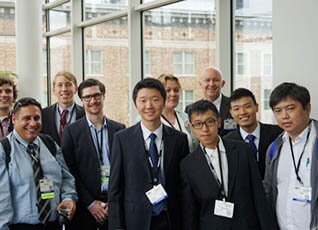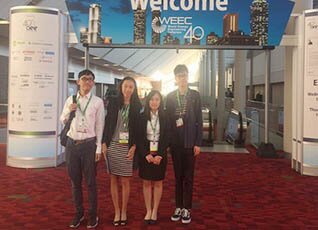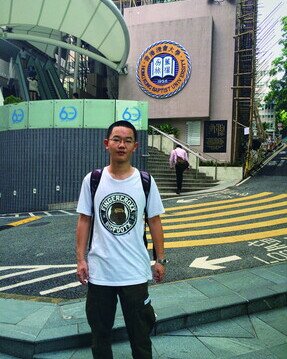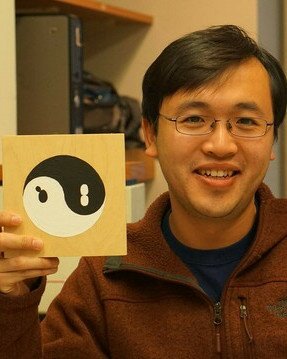Programme Description
Programme Aims
The BSc (Hons) in Physics and Green Energy (PGE) aims at preparing students for a career in Physics and/or in the energy sector that involves applications of scientific principles and technology. In addition to the university-wide whole person education, the specific objectives are to equip students with:
- A solid and broad foundation in physics to build up their careers or to pursue further studies;
- Experimental, theoretical, and computational skills to meet the needs and challenges of contemporary society;
- Analytical thinking and problem-solving skills.
The Programme Intended Learning Outcomes (PILOs)
Upon completion of this study programme, students will be able to:
- Apply fundamental principles in physics including mechanics, electromagnetism, thermodynamics and quantum physics;
- Use skills and knowledge acquired from experimental, theoretical, and computational courses;
- Build future careers or pursue further studies by specializing in Applied Physics or Energy Management and Technology;
- Analyse and solve real-world physics and energy problems;
- Identify the key questions, plan the investigation, and present the scientific results through independent projects and team work.
Starting academic year 22-23, Year 2 students under BSc(Hons) in PGE are expected to select the Applied Physics (AP) Concentration which provides analytical and practical knowledge and skills for students interested in pursuing a future career in technology development and application, innovation as well as research in advanced topics. Graduates will find employment in high-tech companies and industries, or continue post-graduate study in world-renowned universities. Students interested in Green Energy should opt for the BSc(Hons) in Green Energy and Smart Technology.
Major Requirements
Students are required to take a total of 67 units of major discipline courses, which are divided into three categories, namely, Common First-Year Core (13-16 units), Major Core (27 units) and Major Elective (24-27 units).
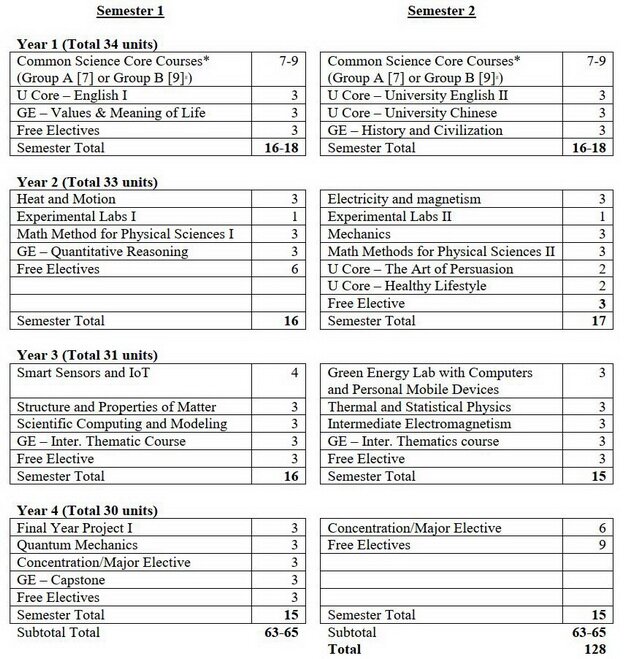
* The University Core courses and the three foundation GE courses should be taken in Year 1 and Year 2.
*For Year 1 science courses, students are allowed to take a minimum of four out of the five 3-units common Year 1 courses offered by the five science departments. If students choose this option, they will be required to take 3 additional units of major elective courses after they have been admitted to a Major Programme in Year 2. Students can also take GE courses or other University-required courses in Year 1 for the 3 units released. SCIE1005 Integrated Science Laboratory is compulsory for all year 1 students.
#Group A: BIOL 1005, CHEM 1005, SCIE1005. [7 units]
#Group B: COMP1005, MATH1025, PHYS1005/PHYS1006. [9 units]
The lists of courses for the concentration are as follows:
Applied Physics Concentration
Minor Programme in Physics and Green Energy
Students seeking to pursue the study of the Physics and Green Energy (PGE) Minor Programme would need to complete 15 units of the courses listed below. They are required to take 6 units of the core courses and 9 units of the elective courses. One of the elective courses taken must be at Level-3 or above.
*Double-counting with GE Capstone
The GE capstone GCAP3035 (Interdisciplinary Independent Study (PHYS)) or GCAP3036 (Innovate for World Solutions) can be double-counted towards the PGE minor elective course requirement. So students who have completed GCAP3035 or GCAP3036 are required to take only 6 units of the PGE minor elective courses.
# Students of Faculty of Science are not allowed to use Introduction to Green Energy or Introduction to Physics to fulfill the PGE minor requirement.
Pathways for Graduates
Graduates are employed by internationally renowned companies and prestigious local organizations and government bodies such as Hutchison Telecom, Hong Kong Science Museum, Hong Kong Observatory and The Hongkong and Shanghai Banking Corporation Limited (HSBC).
Graduate students can also pursuit further study in world-renowned institutions, such as University of Oxford, Brown University, Duke University, the University of Michigan, University of California, State University of New York and NC State University.
Internship opportunities: CLP, EMSD, The Hong Kong Jockey Club, Towngas, Shun Hing Group, ATAL Engineering Group, Japan Solar Energy Development (HK) Limited and SECOM.
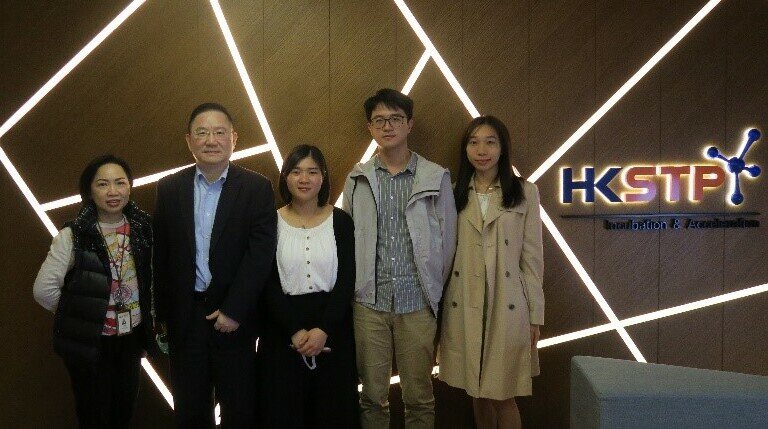
Crimson Vision Technology Limited (宏視科技有限公司), established by Professor Furong Zhu (Physics) in February 2019, is a technology-innovation driven enterprise backed by the Hong Kong Baptist University. By combining near-infrared (NIR) detection and visualizing technologies with cloud computing technologies, Crimson Vision aims to change the current commercial and retail markets globally by crating fast and portable detection Internet of Things (IoT) solutions. Since its inception, Crimson Vision has achieved outstanding results backed by generous support and funding from the Government and University entities. Crimson Vision was awarded the Technology Start-up Support Scheme for Universities funding from the Innovation and Technology Commission of the Government of the Hong Kong SAR and admitted to a 3-year Incu-Tech Programme supported by the Hong Kong Science Park.
| Name of Academics | Company name | Year of Establishment |
|---|---|---|
| Prof K W Cheah (Director & CEO) | Cathay Photonics Limited | 2014 |
| Prof Jeffrey Cheung (Director) | Booguu Company Limited | 2016 |
| Dr Huang Zhi Feng (Director) | Mat-A-Cell Limited | 2017 (Dr Huang left HKBU in Jun 2022) |
| Prof Zhu Fu Rong (Director) | Crimson Vision Technology Limited | 2019 |
School Life
Undergraduate students attend World Energy Engineering Congress:
The World Energy Engineering Congress (WEEC) is an international energy industry conference and exposition hosted annually by the Association of Energy Engineers. It is the largest energy conference and technology expo held in the U.S. specifically for business, industrial and institutional energy users.
Over the past few years, UG students majoring in Physics/Green Energy Science have been actively attending WEEC. They were exposed to cutting-edge energy problems and state-of-the-art energy solutions.
